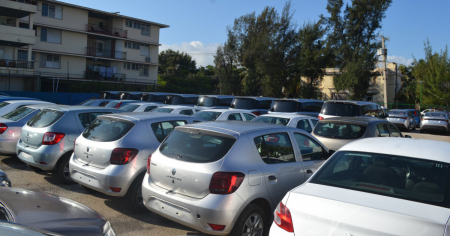
Related videos:
The automotive company Mercedes-Benz celebrated a historic milestone in Cuba with the sale of its first car to a private customer, following the new law on the import and commercialization of vehicles on the island approved by the regime.
With a message on Facebook, MCV Comercial S.A., the official distributor of Mercedes-Benz in Cuba, shared the moment when the first contract with a Cuban customer was signed.
“Today we make history together,” stated the company, which celebrated the recent “opening” of the Cuban market.
This event takes place against the backdrop of a new policy that relaxes restrictions on the marketing of foreign vehicles on the island, but also highlights the growing polarization within the country.
While 90% of the population lives in extreme poverty according to recent figures published by international organizations, an emerging sector can afford to buy cars that, according to the catalog from Mercedes Benz released on Wednesday, have a minimum price of 50 thousand dollars.
Although Mercedes-Benz leads this initial sale, other brands are also available in Cuba, including Chinese ones, which have gained ground in the local market due to their more affordable prices.
According to the recently released catalog, MCV Comercial S.A. offers a diverse range that includes luxury vehicles as well as "more economical" options (ranging from $51,000 to over $191,000, taxes included).
On January 1, several reforms to the regulations regarding the import, sale, and transfer of vehicles came into effect, aimed at modernizing the vehicle fleet and relieving the pressures on access to transportation on the island.
The legal text indicated that there was a need to update a regulatory framework that has remained rigid for decades, with the stated objective of improving management of transportation and loosening access to vehicles.
However, these measures, while significant on paper, appear to be insufficient to address the deep-rooted issues of the transportation crisis on the island, characterized by decades of state inefficiency, unaffordable prices, and excessive restrictions.
Frequently Asked Questions about Car Sales in Cuba by Mercedes-Benz
What does the sale of the first Mercedes-Benz car in Cuba mean?
The sale of the first Mercedes-Benz car in Cuba marks a historic milestone as it is the first transaction of its kind since the Cuban regime approved a new law that relaxes the import and commercialization of vehicles on the island. This event symbolizes the opening of the Cuban market to international luxury brands, although access to these vehicles remains limited for most Cubans due to their high prices.
What are the conditions for buying a car in Cuba under the new regulations?
Under the new regulations, both individuals and legal entities can purchase imported vehicles in Cuba. Individuals must present their identification document. For legal entities, a certificate of registration in the corresponding public registry is required, in addition to a sworn declaration. These measures aim to facilitate access to vehicles, although high prices continue to pose a significant obstacle.
Why does the sale of luxury cars in Cuba generate controversy?
The sale of luxury cars in Cuba, such as those from Mercedes-Benz, generates controversy primarily due to the economic disparity on the island. While a rising minority can afford these vehicles, the majority of the population lives in extreme poverty and lacks access to basic necessities such as transportation. This contrast has sparked criticism of the Cuban regime for prioritizing policies that benefit a very small segment of the population.
What impact do the new vehicle import laws have in Cuba?
The new vehicle importation laws in Cuba aim to modernize the automotive fleet and ease the pressures on transportation access. However, these measures are seen as insufficient to address the transportation crisis on the island, characterized by decades of state inefficiency and unaffordable prices. Although there is a relaxation in property transfer and a reduction in profit margins, high costs remain prohibitive for the majority of the population.
Filed under:





